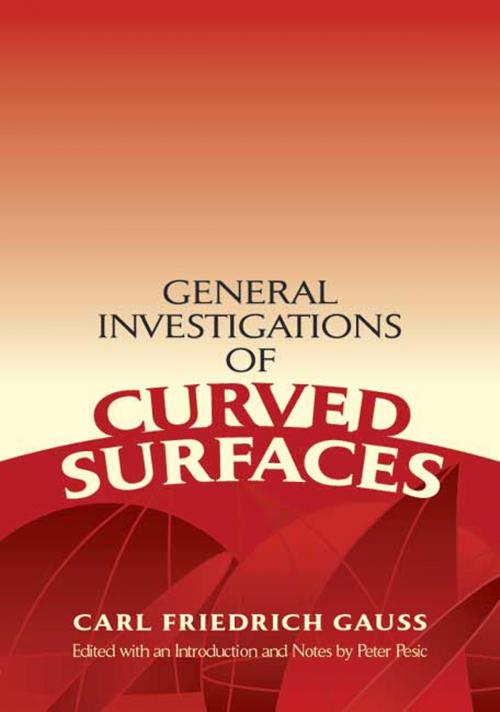General Investigations of Curved Surfaces
Edited with an Introduction and Notes by Peter Pesic
Nonfiction, Science & Nature, Mathematics, Geometry| Author: | Karl Friedrich Gauss | ISBN: | 9780486154817 |
| Publisher: | Dover Publications | Publication: | February 20, 2013 |
| Imprint: | Dover Publications | Language: | English |
| Author: | Karl Friedrich Gauss |
| ISBN: | 9780486154817 |
| Publisher: | Dover Publications |
| Publication: | February 20, 2013 |
| Imprint: | Dover Publications |
| Language: | English |
Gauss's theory of surfaces is among the purely mathematical achievements inspired by ideas that arose in connection with surveys of the surface of the earth. Long regarded as a masterpiece in content and form, this work features one of the author's most original contributions to mathematics--the discovery that Gauss termed the "Theorema Egregium." It consists of his penetrating definition of the concept of surface curvature and the theorem that the "Gauss curvature" is invariant under arbitrary isometric deformation of a curved surface. The profound effects of these concepts were soon generalized by Bernhard Riemann, and subsequent development included the important role of the Gauss-Riemann concept of curvature in modern relativity theory.
This edition of Gauss's classic work features a new introduction, bibliography, and notes by science historian Peter Pesic. In addition, an informative appendix offers historical background.
Gauss's theory of surfaces is among the purely mathematical achievements inspired by ideas that arose in connection with surveys of the surface of the earth. Long regarded as a masterpiece in content and form, this work features one of the author's most original contributions to mathematics--the discovery that Gauss termed the "Theorema Egregium." It consists of his penetrating definition of the concept of surface curvature and the theorem that the "Gauss curvature" is invariant under arbitrary isometric deformation of a curved surface. The profound effects of these concepts were soon generalized by Bernhard Riemann, and subsequent development included the important role of the Gauss-Riemann concept of curvature in modern relativity theory.
This edition of Gauss's classic work features a new introduction, bibliography, and notes by science historian Peter Pesic. In addition, an informative appendix offers historical background.















